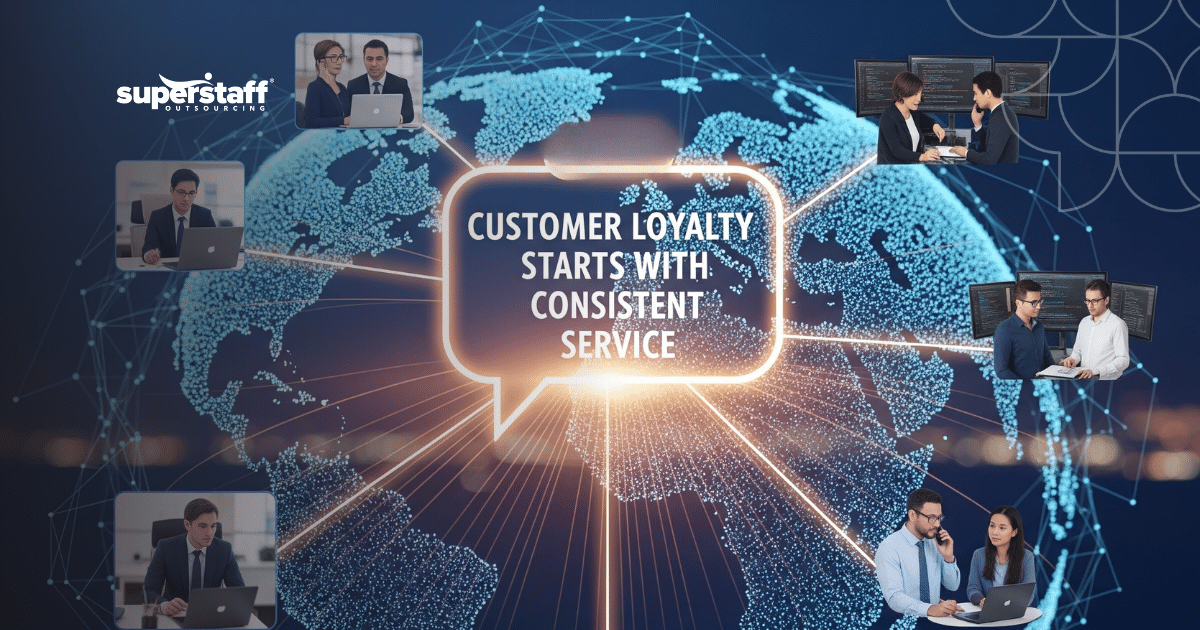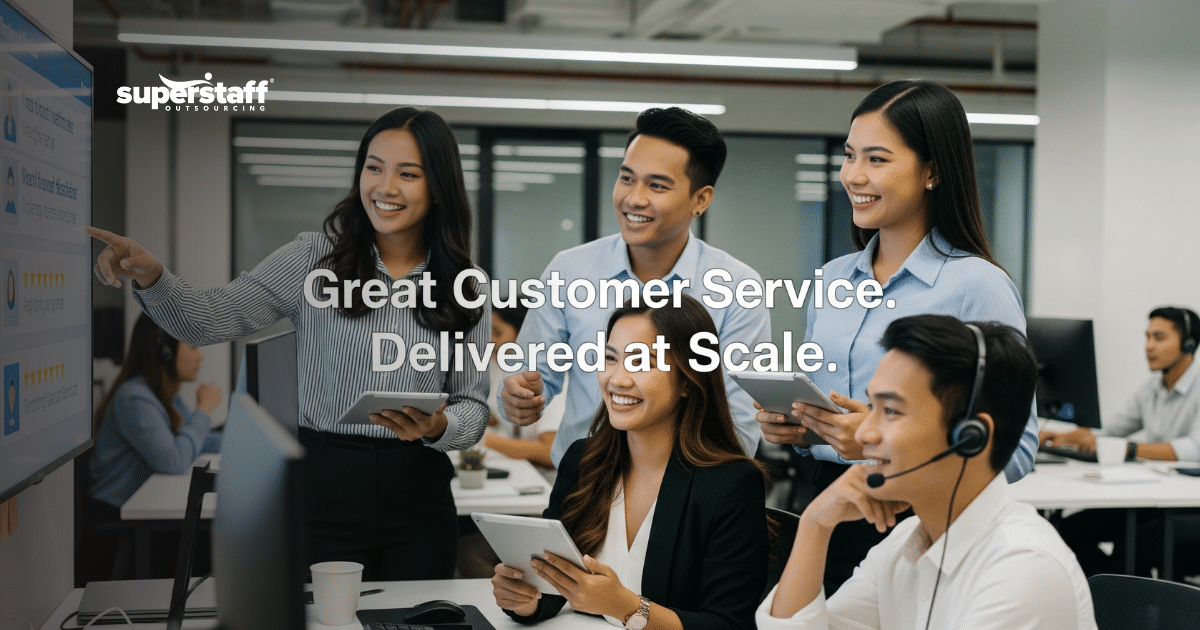
Managing customer expectations is a necessity in the transport and logistics industry. As consumer demand increases, firms must scale their operations to keep up without disrupting their existing operations. They must also stay on top of ever-evolving buyer trends to understand what customers truly want and expect from their chosen businesses.
This article will examine changing customer expectations in transport and logistics. Then, we’ll discuss how smaller firms can meet these challenges head-on by partnering with an outsourcing provider.
3 Main Factors Shaping Customer Expectations in Transportation, Distribution, and Logistics
According to a recent PwC study, leading logistics companies in the world are investing heavily in customer experience. Firms with a solid CX strategy can reduce costs by up to 25% while growing revenue by 5% to 10%.
Customer experience has become a critical competitive differentiator in transport and logistics. Companies that don’t prioritize or invest in CX will quickly struggle to attract and retain consumers.
What exactly do customers want and expect from transport and logistics firms? The same PwC research found the three most essential factors:
#1: Speed and Transparency of Service
For the logistics industry, delivering orders on time should be their top priority.
A 2024 Gitnux Market Report found that speed of deliveries is a primary concern for the average consumer, with 70% saying they will be unlikely to purchase from a company again if their order is not delivered two days within the promised time frame.
The same study highlighted that 45% of consumers would refuse to do business with a company with late delivery times, and 38% would rather cancel their order than wait more than a week for it to arrive.
Beyond speed, customers also seek transparency from their chosen firms. Over one-fourth of buyers say they would drop their orders if businesses don’t provide a specific delivery date.
#2: Availability of Self-Service Options
The PwC study shared above found that transport and logistics clients began utilizing self-service options more during the COVID-19 crisis. Now, post-pandemic, many customers, especially those in the B2B sector, still prefer this to traditional support methods because of its speed and convenience.
Of course, providing self-service options isn’t only beneficial for customers. It can also offer a wealth of advantages for transportation and distribution companies.
To illustrate, let’s discuss the real-life case of My DHL Parcel. As one of the world’s top logistics and shipping companies, DHL delivers over 1.7 billion parcels and packages each year.
Because of increasing customer demand, DHL struggled to handle the large volume of buyer inquiries. To help reduce support tickets, they worked with IO Digital to create a self-service platform called “My DHL Parcel.”
Their partnership resulted in a 25% decrease in support tickets for DHL, a 12% growth in daily shipments, and 50% less time spent creating shipments. To this day, My DHL Parcel boasts over 6,000 active users globally.
#3: Multi-Channel Management
Despite the availability of self-service options, not all buyers prefer this support method. Some still feel more comfortable reaching out to customer service over the phone or through email, while others expect companies to respond to them on social media or live chat.
According to a TCN survey, 40% of customers want multiple communication options, and 52% expect 24/7 customer service to be available. Meanwhile, a Zendesk Consumer Trends Report emphasized that 62% of people expect a seamless flow of experiences between a company’s physical and digital spaces.
So, how should distribution and logistics companies handle the different customer preferences? The ideal solution is to invest in omnichannel support.
Logistics firms can meet this customer expectation without overwhelming their in-house staff by outsourcing customer service to a call center with omnichannel capabilities. No matter the time or day, consumers can easily inquire about your services and rates, ask for updates on their delivery status, and resolve issues.
Strategies for Meeting Customer Expectations in Transport and Logistics Management
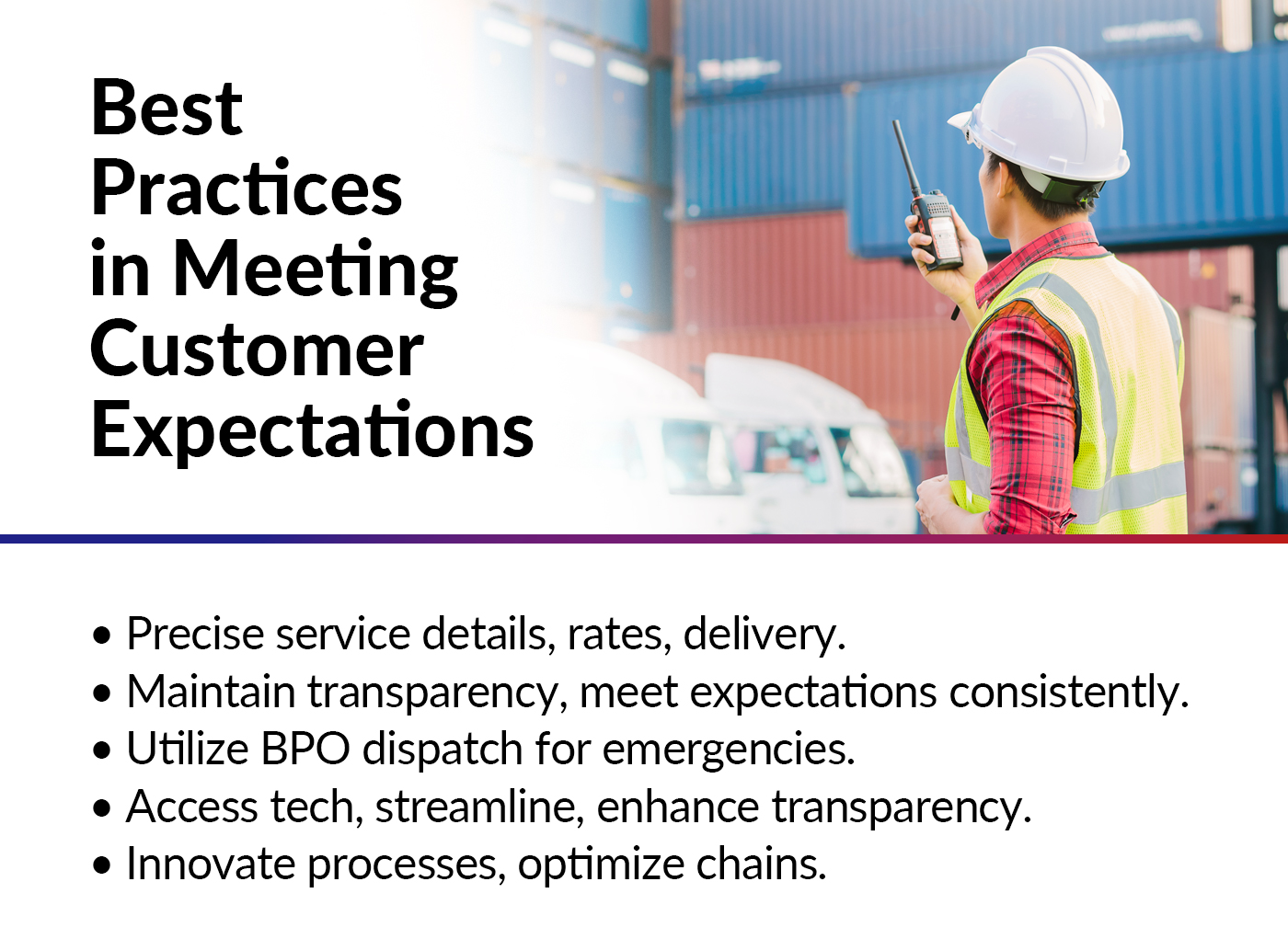
Set clear and realistic expectations through proper communication.
Setting clear and realistic expectations is the first step to improving your customer experience. When a potential client reaches out to your logistics services company, make sure that your outsourced customer service team knows how to answer service inquiries, clarify your processes, and provide detailed information about your rates and miscellaneous fees.
The goal should be to avoid providing inaccurate or incomplete information that could lead to problems down the road. For instance, if a customer asks when they should expect their delivery, give them an estimate your firm can realistically achieve.
Remember: Don’t make promises you can’t keep. Doing this will not only irritate your clients but potentially damage your overall reputation.
Practice transparency by offering more proactive customer support.
Another way to enhance customer experience in logistics is to practice transparency. According to a DispatchTrack report, 90% of buyers want to track the status of their orders, but more than one-third aren’t able to.
The same report found that 80% of consumers want consistent delivery status updates, and 27% expect to be notified of any new developments, even if it involves multiple daily notifications.
Firms can achieve customers’ desired transparency by outsourcing support and logistics services to a BPO provider. An outsourced back office team can handle order tracking and tracing, which gives companies real-time supply chain visibility and allows them to notify customers about their delivery status.
Be flexible and adaptable in meeting customer needs.
Sometimes, no matter how hard you try to prevent a delayed shipment, an unexpected crisis or emergency will occur, throwing all your plans out the window. When these situations happen, what’s important is your ability to bounce back and resolve the issue at hand.
Through BPO dispatching services, companies can gain the logistical assistance they need to address disruptions and handle emergencies. These support professionals can help your delivery personnel find alternative routes to get the deliveries back on track. They can also notify customers about the situation and provide a new estimated arrival time for their order.
Leverage technology to streamline processes.
Smaller logistics firms may not have the in-house resources and capabilities to adopt emerging technologies. Partnering with a BPO provider can give them access to cutting-edge tools and software and provide integrated logistics support.
Ideally, outsourced teams utilize track-and-trace technologies to enhance transparency across all supply chain steps. This enables them to identify bottlenecks, proactively address potential issues, and empower your delivery staff to fulfill orders on time.
If your transport and logistics company wants to accelerate digital transformation, you can also work with outsourced software developers and engineers. These specialized professionals can innovate your processes, optimize your supply chains, and enhance your overall customer experience.
How Outsourcing Logistics Support Solutions Can Help You Build Customer Loyalty
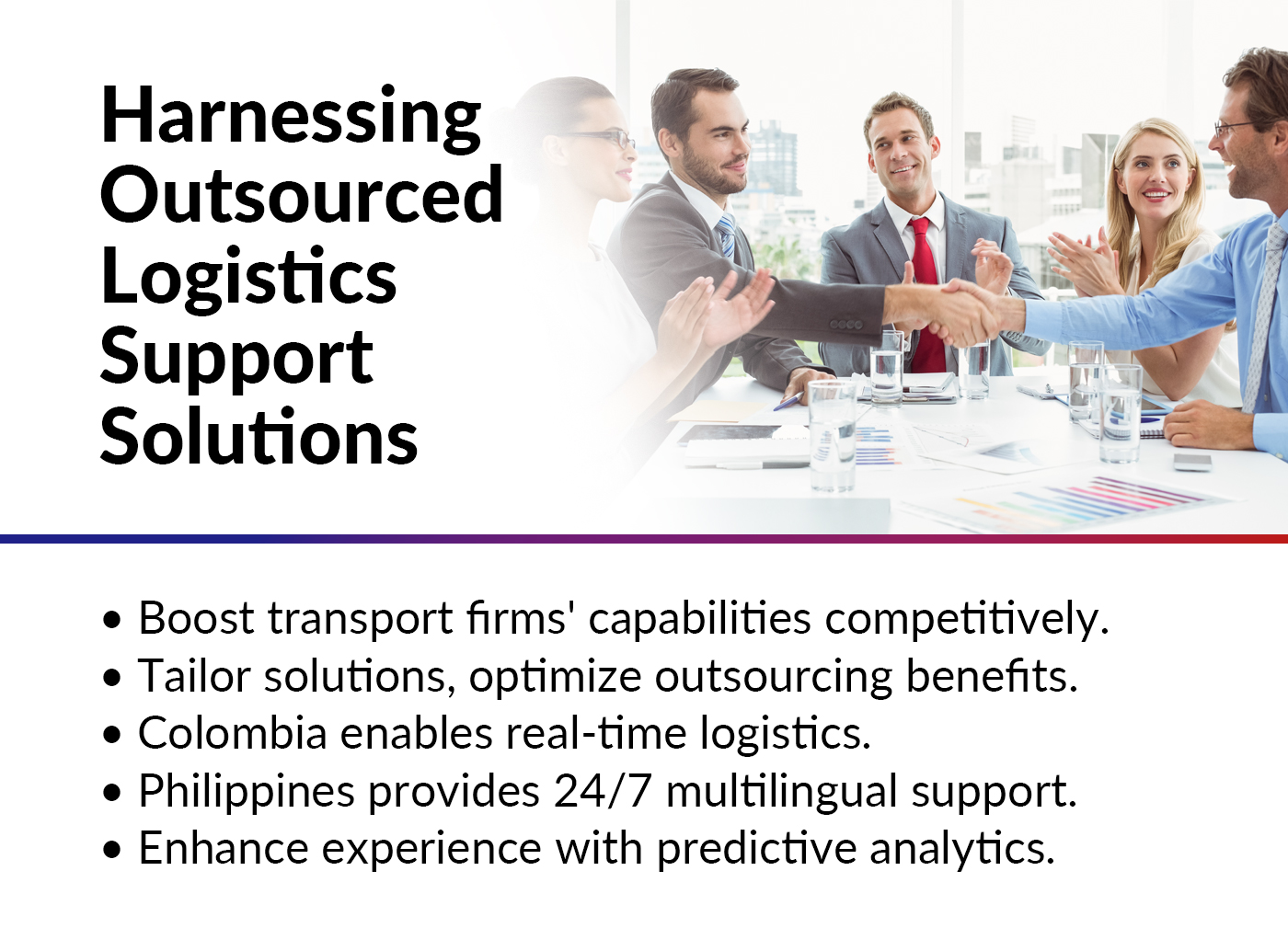
Address Limitations Through Strategic BPO Partnership
Just because you’re a small or mid-sized transport and logistics firm doesn’t mean you can’t compete with the leading players in your industry. With a strategic outsourcing partnership, you can go beyond your limitations and expand your capabilities without breaking the bank.
The right BPO partner knows there is no one-size-fits-all solution for every business. They will assess your firm’s specific needs and create a customized strategy that will help you maximize your outsourcing arrangement.
Nearshore Logistics Support + Offshore Customer Service = Enhanced CX
For instance, location matters in the logistics industry. To give you greater control over your supply chain, your BPO provider can connect you with a nearshore team in Colombia that can provide real-time dispatching and logistics support. Since you’re in similar time zones, there will be little to no communication delays, allowing for seamless route planning and order fulfillment.
At the same time, you can take advantage of the Philippines’ lower labor costs and high English language proficiency. While your logistics support team is located nearshore, you could have an offshore customer service department for 24/7 omnichannel and multilingual support.
Gain a Competitive Edge Through Personalized Services
Personalization is an essential factor in improving customer experience. Your clients want to feel you care about their needs and are dedicated to solving their most pressing pain points.
Through data science outsourcing, you can better understand your target customers’ needs and more easily personalize your services to meet them. You can also utilize predictive analytics to spot, anticipate, or prevent supply chain and logistics problems before they occur, facilitating a seamless order delivery and transaction for clients.
Achieve Reliability and Consistency
Beyond addressing your current limitations and enabling personalization, outsourcing logistics solutions can also help you achieve these two important things: consistency and sustainability.
One of the main advantages of outsourcing customer service and support functions to a BPO provider is that you can rely on them to provide measurable results. They use CX KPIs and metrics to evaluate whether your offshore and nearshore teams meet your goals and expectations.
Instead of simply assuming they’re doing their job, you can see the data and make your own assessments. Your ideal BPO partner would communicate with you regularly and update you on the progress of your outsourcing operations.
Challenges Faced By Smaller Transport and Logistics Companies (and How Outsourcing Can Help Address Them)
Now that we’ve discussed customers’ expectations, let’s consider this question: what’s preventing smaller transport and logistics firms from meeting these demands? Here are just a few of the limitations and challenges small and mid-sized businesses may need to address:
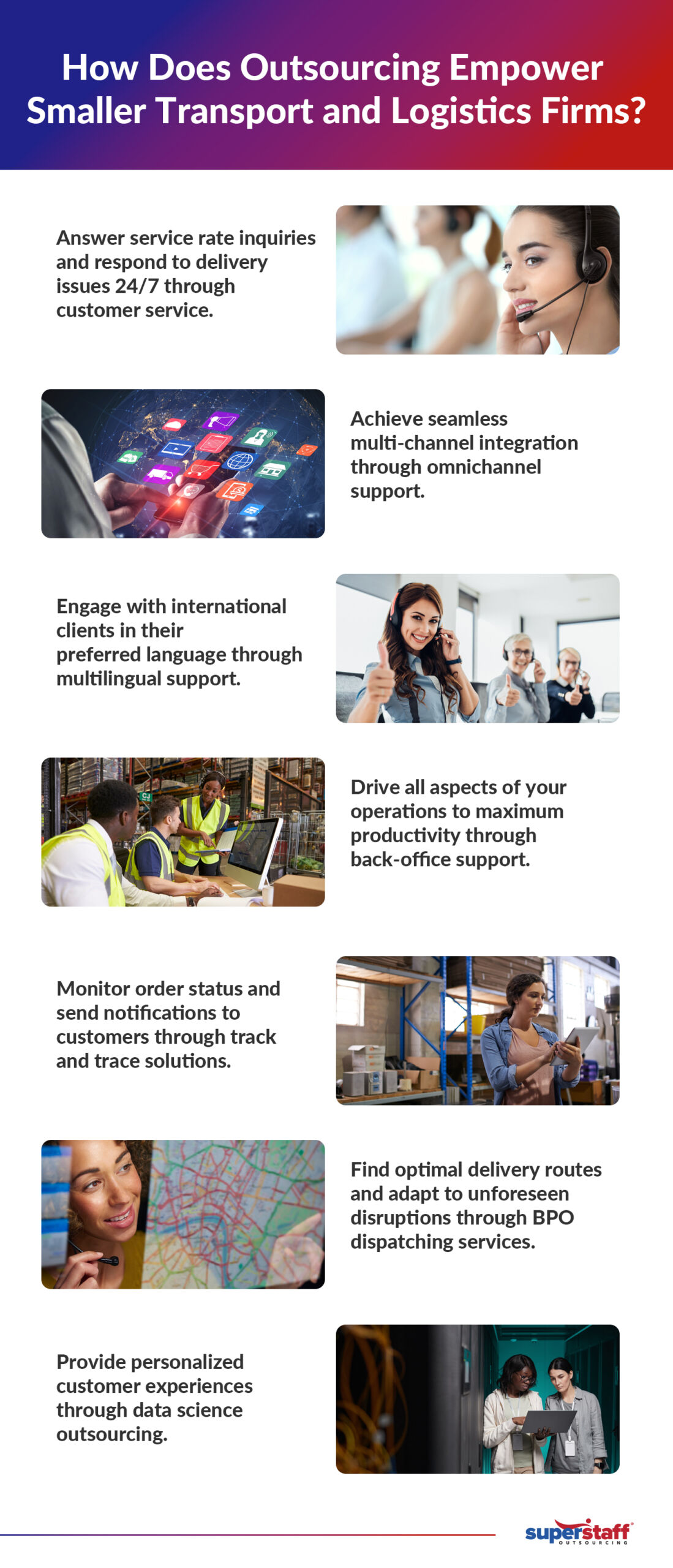
Limited Resources and Capabilities
One of the biggest challenges facing smaller transport services firms is their limited resources and capabilities. Unlike the top 100 shipping and logistics companies in North America, which can easily afford to scale up their operations, small firms need to be more conservative with their budget and avoid unnecessary expenses to retain profitability.
How Outsourcing Can Help
Working with a BPO provider can help logistics firms achieve significant cost savings while expanding their capabilities. Since outsourcing companies have access to a high-quality offshore and nearshore talent pool, small transport firms can take advantage of more cost-effective labor costs outside their home country while effectively expanding and strengthening their operations.
Competition With Larger Companies
Another problem many transport and logistics firms face is needing to keep pace with the big players in their industry. In previous sections, we mentioned the rising consumer demand for speedy deliveries.
Large and well-established logistics companies typically have the in-house capability to speed up their travel times and optimize their supply chain operations, leading to faster order fulfillment. To keep up, smaller firms must increase their overhead expenses by hiring more workers with specialized expertise. Unfortunately, this is not something everyone can afford to do.
How Outsourcing Can Help
Hiring a BPO partner can give small transport and logistics firms the edge they need to compete with the big players. Instead of investing time and resources into one sizeable in-house workforce, companies can support their core team by outsourcing logistics and support functions to a third-party provider.
Diversifying their operations through offshore and nearshore outsourcing can give small firms more flexibility, allowing them to upgrade or downgrade their operations depending on fluctuations in demand. BPO providers can also help streamline their processes, improving efficiency and productivity without overwhelming their in-house staff.
Diverse Customer Demands
As we’ve repeatedly discussed, customer experience is crucial for the transportation and logistics sector. To thrive in today’s competitive business landscape, firms must know what their customers want and work hard to align their services with client expectations.
However, customer demands are diverse and continually evolving. The trends present today may not be the same in months or years. Logistics services companies can adapt to these ever-changing expectations through customer support outsourcing.
How Outsourcing Can Help
The right BPO partner will keep an eye on modern consumer trends, adapting their strategies depending on your organization’s particular needs and goals. Beyond 24/7 omnichannel capabilities, outsourced customer service teams can provide hyper-personalized solutions and proactive support without sacrificing authenticity and genuine human interaction.
Additionally, transport and logistics companies cater to customers across the globe. As such, providing multilingual support is essential, even for smaller firms. By allowing customers to speak to you in their native language, you can expand your international reach, improve client relationships, and avoid misunderstandings and conflicts.
Reinvent Your Customer Experience With the BPO Logistics Support Professionals
Long-term customer relationships are worth the effort. If your transport and logistics firm is serious about investing in CX, don’t hesitate to get in touch with the outsourcing experts at SuperStaff.
With our vast range of comprehensive and scalable BPO solutions, we can fill the gaps in any aspect of your logistics operations. Whether you need customer service, back office, logistics support, software development, or data science professionals (or a team involving all of the above), you can count on us to connect you with the right talent.
Let us help empower your growing business to reach new heights!

